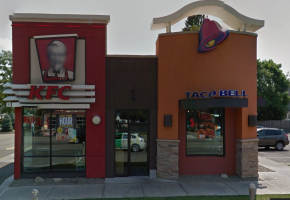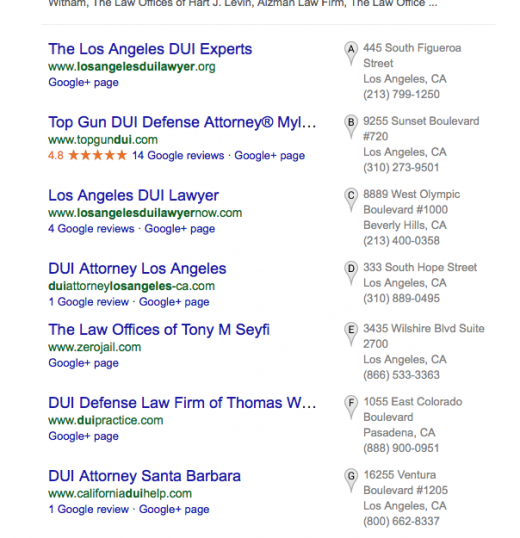Understanding Google My Business & Local Search
Google – Some Days I Just Shake My Head – Today is One of Them

Over the past several days, a number of Google “annoyances” have cropped up…. sometimes it is amazing where a company like Google chooses to put its head…. that I wanted to get off my chest.
1- Did you know that Google’s bulk upload, even though upgraded multiple times with a raft of new ownership, management and social features still has a 200 character limit to the description field? Only known solution: open every G+ Page and upgrade the description manually. Even the few companies that have access to the G+ Plus API and that manage bulk uploads can’t affect this field. How lame is that?
2- Google obviously put a lot of work into the new guidelines and the examples. And in many cases made things much more clear. Kudos.
But then why do they need to obfuscate things like virtual office guidelines?
- If your business rents a temporary, “virtual” office at a different address from your primary business, do not create a page for that location unless it is staffed during your normal business hours.
That statement could have been written by Franz Kafka… and leaves one in awe. Just what does it mean? Was it intentionally meant to not inform so that it could be enforced only when desired?
Certainly they deserve scorn over the descriptor fiasco but it seems to me that there are new fiascos in the making with their “Two or more brands at the same location” guidelines in general their examples in particular.
- Acceptable: “TCC Verizon Wireless Premium Retailer”, “U-Haul Neighborhood Dealer”
I don’t know about Verizon but I do know about U-Haul Neighborhood Dealers. These are gas stations, repair shops and used car lots that have added U-Haul as a product line. This U-Haul Neighborhood Dealer is also Cars Are Us. Same paluka answering both phones and as you can see from Streetview no obvious U Haul branding. Yet he gets two pages not one. Isn’t that what categories are for?
And somehow those tiny KFC/Taco Bell shops garner two pages while the Lebanese, Greek, American, Italian restaurant would be tagged a spammer if they had two.
 3- And finally spam in general but DUI Lawyer spam in LA in particular. Name spam, location spam, spam, spam, spam. Its on the front page, it’s in maps. It’s freakin’ everywhere. When you call many of these listings they often won’t answer with their company name just a “hello” and when you ask where they are located it will be any place but LA.
3- And finally spam in general but DUI Lawyer spam in LA in particular. Name spam, location spam, spam, spam, spam. Its on the front page, it’s in maps. It’s freakin’ everywhere. When you call many of these listings they often won’t answer with their company name just a “hello” and when you ask where they are located it will be any place but LA.
It isn’t just DUI, its in virtually every major category in LA. See this post by Linda. And this stuff has been around for ages, reported multiple times, through multiple channels…. hello?
© Copyright 2025 - MIKE BLUMENTHAL, ALL RIGHT RESERVED.
Comments
23 Comments
no comment necessary.
Just agreeing
Lot of power, Zero accountability, generally no entity of any sort calling them out in any way in terms of responsiveness.
Except for China, which essentially banned them…and Europe, which is taking them on .
Mike, search for restaurants in a city in Great Britain and search for restaurants in a city in the US. The difference in quality of information is beyond stark. Its breathtaking.
that differences are just because we Europeans have been not “blessed” by the pigeon ranking
This just in and recent as well:
Google local search now fails to give you the closest location if it’s same business/chain:
https://plus.google.com/+MaxMinzer/posts/8RKJMkYh9No
Hey Mike, that KFC pic is a kick!
And thanks for linking to my post.
I guess more than anything I’d like to see some of the blatant spam and fake listings cleaned up to make a more level playing field for all the businesses that are trying to play by the rules. But I realize it’s a huge job!
In the bulk upload platform you still can’t add cover or profile photos. So if you wanted to add those, you also have to open up every page in GMB and add them manually. Try doing that for 30k locations!
Wow….the DUI lawyer example is astonishing, both that it’s getting past them, and that those are ranking well….because SURELY they’re not listed that way in all of the major business directories, so there SHOULD be a consistency issue that pushes them out of the top few (especially with a search category that’s so competitive).
Oh, and I had to look up paluka. There, I admitted it.
@ehg and dave
are they better or worse in Europe?
@Sara
Well that is my complaint for tomorrow as those are not easily configured via MyBusiness either… what a kludge.
@Michael
It seemed fitting. Obviously it is a word from my youth: https://books.google.com/ngrams/graph?content=palooka&year_start=1800&year_end=2000&corpus=15&smoothing=3&share=&direct_url=t1%3B%2Cpalooka%3B%2Cc0
@Linda
Yes ironic that the Colonel’ privacy is respected, eh?
Yes spam is a huge problem but they have had 6 years to work on it . If a new road can be reported, acknowledged and integrated into their Map in a few weeks then why can’t obvious and blatant spam get the same treatment?
Mike:
Go to google.co.uk look for restaurants in a city in Britain. Compare those results to what you get for a search restaurants in any city in the US.
Results in Europe are infinitely better, more informative, fuller, more user friendly.
The difference is extraordinary.
Just use Bing.
For more than a year the #1 result for website design in Buffalo, NY was a guy that was located at a water fountain in the “city center” portion of the Google Map. After numerous reports that this guy was not located there he still ranks well on maps.
Mile, are we frustrated… just a bit Name spam, location spam, spam, spam, spam. Its on the front page, it’s in maps. It’s freakin’ everywhere. LOL
Name spam, location spam, spam, spam, spam. Its on the front page, it’s in maps. It’s freakin’ everywhere. LOL 
However, I do agree, ‘in principle’ with the “Two or more brands at the same location” guidelines.
@Andy
If you had seen my first title to the article… you wouldn’t have had to ask.
Maybe this is why finding a business online is just a small lead-in to a business or consumer decision. Influence Central as quoted by http://www.bargain-value.com/what-good-reviews-mean-business/ says the following:
• 88% of people consider online reviews “very influential” when making buying decisions from a company or brand they are unfamiliar with.
• When familiar with a brand or company, 67% of women still consider online reviews “very influential” before purchasing a new product or service from the company or brand they trust.
• On Amazon, 90% of buyers let their actions be determined by reviews.
• 43% of product consumers (people who have already bought a product) check online reviews to see if there are better product options or if others have had similar experiences with their purchases.
• 97% of consumers say that they can determine the credibility of a review.
It sounds to me like the erosion of trust in a search engine’s results is known by most consumers and they hardly give it a second thought. They just move on to the vetting process of review searches before making a choice, even for a known familiar brand. If spammers and businesses understood this, they might put a lot more emphasis in deserving and obtaining good reviews before doing so much to increase search engine visibility.
I make a good living doing SEO (without the spam) but business owners need to realize the web is not a panacea to make up for poor quality in any aspect of their business.
PS. I’d love to know that first title to your post!
@Dave
Way too porky for polite company to share.
The DUI web type spam is kind of mind boggling, especially when the companies answer the phone and indicate they are at a different location. Is it just luck that they get by Google phone checks? Regarding the virtual office, I think that’s pretty obvious. If there is someone there during the day when Google calls to check up on them, all is fine and dandy. If a voice mail answers or if the call transfers to a different office, then the listing will probably be taken down. Regarding the Taco Bell restaurant, I am no expert on Taco Bell; however, the big as life picture with two separate facades, one KFC and one Taco Bell, which a Google photographer, for example, might photograph and add to the web is likely to be very convincing to Google anti-spam staff that there really are two restaurants at that location.
Google is a huge part of doing well online but it seems to me, as someone who tries to promote my firm on the web, but who doesn’t have external help, that the main thing google is trying to do is to make it a full time job just to keep up with google – they seem to be obsessed with tinkering – change is good and evolution, but it seems like they have a huge team of people just tinkering the whole time.
@donovan. They do.
The easiest solution to the spam problem is to return all SABs (service area businesses with hidden addresses) back to Map Maker, and allow crowdsourcing to do what the LEs (Listing Editors) are clearly incapable of doing, which is detect and remove spam. Spam reports should just go directly to a review team which is better trained to evaluate and remove them. Training them to detect and remove spam is easy-peasy once you know the tricks and patterns that spammers employ, and how to evaluate the legitimacy of a business. Once you’re efficient at the task, it should take less than 30 seconds, using Google searches, street view, online licensing databases, and common sense, to evaluate and remove a spam POI, without having to reach out to the business in question via phone call, who will always tell you that they’re not spam (even if they are). If that was done, it would be a fairly easy task to clean up an area and business vertical, and could provide a nice stream of income for SEO specialists to remove spam, while relieving Google of the burden of embarrassing themselves with their ineffectual and half-a**ed efforts.
Comments for this post are closed.